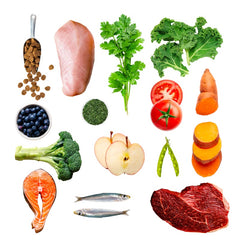
As a pet owner, you want nothing but the best for your furry friend, and that includes their digestive health. If you've noticed your dog experiencing digestive issues such as bloating, constipation, or diarrhea, you may be wondering how you can help them find relief.
The good news is that your dog's diet can play a significant role in their digestive health.
By making some simple changes to their diet, you can help your dog achieve regular bowel movements and alleviate digestive problems. In this article, we'll explore the connection between diet and digestive health in dogs.
Fortunately, this topic is something we know a lot about here at Delivery hound and we have put together some common causes of digestive problems and tips on how to make dietary adjustments to promote better digestive health for your furry friend. Let's get started!
Common Digestive Problems in Dogs
Digestive problems are common in dogs and can be caused by a variety of factors, including diet, stress, and underlying health conditions. Some of the most common digestive problems in dogs include:
Constipation
Constipation occurs when the stool is too hard and difficult to pass. It can be caused by a lack of fiber in the diet, dehydration, or underlying health conditions such as hypothyroidism or kidney disease.
Diarrhea
Diarrhea is characterised by loose or watery stools and can be caused by a variety of factors, including stress, diet changes, infections, and underlying health conditions such as inflammatory bowel disease.
Bloating
Bloating occurs when the stomach fills with gas, causing discomfort and pain. It can be caused by eating too quickly, overeating, or underlying health conditions such as bloat or pancreatitis.
Learn more about gut health in dogs here.
The Role of Diet in Maintaining Digestive Health
Your dog's diet plays a significant role in their digestive health. A diet that is high in fiber can help promote regular bowel movements and prevent constipation. On the other hand, a diet that is low in fiber can contribute to constipation and other digestive problems.
In addition to fiber, the quality of your dog's diet can also impact their digestive health. A diet that is high in processed foods, fillers, and artificial preservatives can be difficult for your dog to digest and can contribute to digestive problems.
At Delivery Hound, we recognise the growing popularity of grain-free dog food among pet owners who prioritise a diet that promotes healthy digestion for their furry companions. Unlike humans, dogs have not naturally adapted to consuming grains and may struggle to digest them effectively. Grain-free dog food is typically formulated with protein-rich ingredients like chicken, lamb and fish resembling the diet of their wolf ancestors. Moreover, numerous dogs suffer from grain allergies, such as corn and wheat, which can result in skin problems and digestive complications. By selecting Man's Best Grain Free dog food, pet owners can ensure their dogs receive essential nutrients without unnecessary fillers.
Enhancing digestion enables dogs to absorb more nutrients from their food, leading to improved overall health and vitality. Moreover, digestive care food aids in alleviating symptoms associated with digestive issues, including bloating, gas, and discomfort. Check out the full range of digestive friendly dog food formulas here!
Understanding Dog Food Labels
To make informed decisions about your dog's diet, it's essential to understand how to read dog food labels. The label should list the ingredients in descending order by weight, with the first ingredient being the most prominent.
Look for dog food that contains high-quality protein sources such as chicken, lamb, or fish. Avoid dog food that contains fillers such as corn, wheat, and soy, as these ingredients provide little nutritional value and can be difficult for your dog to digest.
Ingredients to Avoid in Dog Food
To promote better digestive health for your dog, it's essential to avoid certain ingredients in their diet. Some of the most common ingredients to avoid include:
Grains
Grains such as corn, wheat, and soy are often used as fillers in dog food. These ingredients are high in carbohydrates and can be difficult for your dog to digest, leading to digestive problems.
Artificial Preservatives
Artificial preservatives such as BHA, BHT, and ethoxyquin can be found in some dog foods. These ingredients have been linked to various health problems, including digestive problems.
Meat By-Products
Meat by-products are the leftover parts of an animal, such as organs that are not fit for human consumption. These ingredients can be difficult for your dog to digest and may contribute to digestive problems.
Foods to Add to Your Dog's Diet for Better Digestion
 your dog's diet to promote better digestion. Some of the best foods to add to your dog's diet include:
your dog's diet to promote better digestion. Some of the best foods to add to your dog's diet include:Pumpkin
Pumpkin is high in fiber and can help promote regular bowel movements. It can also help alleviate diarrhea and constipation.
Apples
Apples are high in fiber and water, helping your dog feel fuller for longer. Additionally, apples have antioxidant compounds like quercetin which may help protect against cancer and other diseases.Sweet Potato
Sweet potato is high in fiber and can help promote regular bowel movements. It's also a great source of vitamins and minerals.
Tips for Transitioning to a New Diet
If you're planning on transitioning your dog to a new diet, it's essential to do so gradually. Sudden changes in diet can cause digestive upset and lead to diarrhea or vomiting.
Start by mixing a small amount of the new food with your dog's current food and gradually increase the amount over time. The key to switching your dog’s food is to transition slowly. Start by mixing the new formula with the old food and slowly reduce the amount of old food over 7-10 days until only the new formula remains. This will give your dog's digestive system time to adjust to the new diet.
Learn more here on transitioning your dog to a new dog food.
Supplements for Digestive Health
In addition to dietary changes, there are also supplements you can give your dog to promote better digestive health. Some of the best supplements for digestive health include:
Probiotics
Probiotics contain beneficial bacteria that can help promote healthy digestion. They can be found in supplement form or in foods such as yogurt.
Digestive Enzymes
Digestive enzymes can help your dog break down their food more efficiently, leading to better digestion. They can be found in supplement form.
When to Seek Veterinary Advice
If your dog is experiencing digestive problems, it's essential to seek veterinary advice. Your vet can help identify the underlying cause of the problem and recommend appropriate treatment.
advice. Your vet can help identify the underlying cause of the problem and recommend appropriate treatment.
In some cases, digestive problems can be a sign of a more serious underlying health condition, such as pancreatitis or inflammatory bowel disease.






